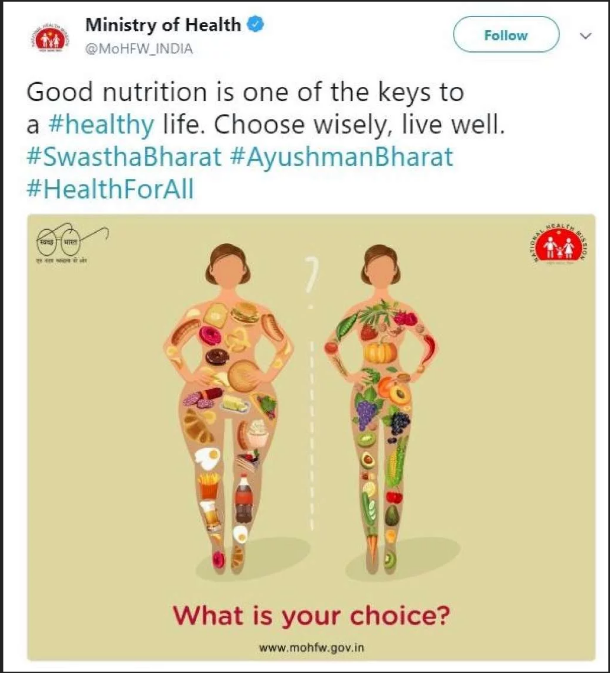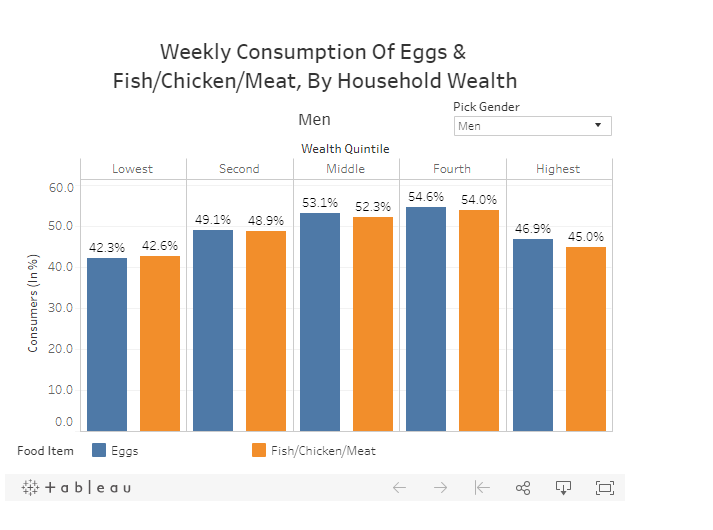New Delhi, May 22: India’s Bharatiya Janata Party-led government has been advocating vegetarianism on grounds of religion and ideology, the latest being an effort by Indian Railways railways to enforce vegetarian menus on all trains on Mahatma Gandhi’s birthday, Oct. 2.
However, around 80 percent of Indian men and 70 percent of women consume eggs, fish, chicken or meat occasionally, if not weekly, according to an IndiaSpend analysis of national health data. But their daily diet tends to be vegetarian, consisting of milk or curd, pulses or beans and dark green and leafy vegetables.
Also Read: Indian Railways To Use Artificial Intelligence To Ensure Hygienic Food On Trains
Overall, 42.8 percent Indian women and 48.9 percent men consumed fish, chicken or meat weekly, according to the National Family Health Survey, 2015-16.
It is important to assess the average diet of an Indian because both malnutrition and obesity are a problem: 53.7 percent women and 22.7 percent men are anaemic and 22.9 percent of women and 20.2 percent of men are thin (with body mass index of less than 18.5), while 20.7 percent of women and 18.9 percent men are overweight or obese, according to the same data.
The Ministry of Health and Family Welfare had recently courted controversy when it tweeted an image that grouped non-vegetarian foods such as eggs and meat with junk food, implying that both cause obesity. The image was subsequently deleted.
In 2015, Madhya Pradesh government had banned eggs from meals served in anganwadis or day-care centres allegedly due to pressure from Jain groups.
These moves come despite the recommendations of the National Institute of Nutrition, Hyderabad, which advocate the consumption of protein-rich animal foods such as milk, meat, fish and eggs–and plant foods such as pulses and legumes.
“Animal proteins are of high quality as they provide all the essential amino acids in right proportions, while plant or vegetable proteins are not of the same quality because of their low content of some of the essential amino acids” said NIN’s dietary guidelines.
Also Read: Why India’s Packaged Food Market Will Jump To $200 Billion In A Decade
The Indian Railways are now planning to celebrate the birth anniversary of Mahatma Gandhi, a vegetarian, as ‘vegetarian day’. It plans to serve only vegetarian food on its premises and appeal to all its employees to abjure meat that day, reported Times of India on May 21, 2018.
Dietary risk, including poor diet–low in fruits, vegetables, whole grain but high in salt, fats–is the third biggest risk factor for death and disability in India after air pollution and malnutrition, IndiaSpendreported in November, 2017.
In Women, 37.4 Percent Have Eggs, 36 Percent Fish, Chicken Or Meat Weekly
More men than women eat non-vegetarian food in India; almost three in ten women do not consume eggs (29.3 percent) and chicken, fish or meat (29.9 percent) compared to two in ten men who do not consume eggs (19.6 percent) and chicken, fish or meat (21.6 percent).
Among women between the age of 15-45 years, 45 percent have milk and curd, 44.8 percent have pulses or beans, and 47.2 percent have dark green, leafy vegetables daily, while 37.4 percent eat eggs and 36.6 percent eat fish, chicken or meat weekly. Almost half–51.8 percent–of them have fruits occasionally.
Among men between 15 and 45 years of age, 46.2 percent have milk and curd, 46.5 percent have pulses or beans, 46.6 percent have dark green, leafy vegetables daily ,while 44.7 percent eat eggs, 43.3 percent eat fish, chicken or meat weekly and 47.6 percent have fruits occasionally.
Age, Marital Status, Geography, Wealth And Caste Are Factors
Weekly consumption of food items is not the same for all groups and follows different trends. But those over 19 years tend to eat more eggs and any kind of meat every week.
Among men, the highest consumption of eggs and meat was among those who were never married (50.5 percent for eggs and 49.2 percent for fish, chicken or meat). Also, urban men (53.8 percent for eggs, 52.8 percent for fish, chicken or meat) eat more non-vegetarian food than rural men (47.1 percent for eggs, 46.5 percent for fish, chicken or meat).
Among women, the highest consumption of eggs and meat was among those who were widowed or divorced or deserted (41.5 percent for eggs and 47.4 percent for fish, chicken or meat).
Education appears to decide the choice of vegetarian/non-vegetarian foods. Those who have studied up to five years eat the highest amount of eggs and meat–men (54.2 percent and 57.6 percent) and women (48.2 percent and 51.8 percent).
Among religions, Christians consume eggs and meat the most–men (71.5 percent and 75.6 percent) and women (64.7 percent and 74.2 percent). This is followed by Muslim men (66.5 percent and 73.1 percent) and women (59.7 percent and 67.3 percent).
The highest consumption of eggs and fish, chicken or meat is among those who said they did not know their caste–men (49.2 percent and 51.6 percent). This holds true for women as well for eggs; for fish, chicken and meat it is highest in ‘other’ caste.
And while the consumption of eggs and meat increases with household wealth, a lower percentage of men and women among the richest 20 percent Indians consume eggs and meat.
Most Meat Eaters In Kerala, Fewest In Punjab
Data on women show that Kerala (92.8 percent), Goa (85.7 percent) and Assam (80.4 percent) have the highest weekly consumers of fish, chicken or meat, while Punjab (4 percent), Rajasthan (6 percent) and Haryana (7.8 percent) rank the lowest.
Figures for men show that Tripura (94.8 percent), Kerala (90.1 percent) and Goa (88 percent) are the highest weekly consumers of fish, chicken or meat, while Punjab (10 percent), Rajasthan (10.2 percent) and Haryana (13 percent) are the lowest.
The consumption of meat on a weekly basis is high in the northeast and south India. It is the lowest in the north for both the genders.
(Yadavar is a principal correspondent with IndiaSpend.)
This article has been published in arrangement with IndiaSpend.
Let the Truth be known. If you read VB and like VB, please be a VB Supporter and Help us deliver the Truth to one and all.
Kalyani (West Bengal) (PTI): Sixty seven years after their maiden appearance, Jammu and Kashmir stormed into the Ranji Trophy finals for the first time on Wednesday, upstaging two-time former champions Bengal by six wickets in the semifinals here to add another historic chapter to a fairytale season so far.
Auqib Nabi's stunning nine-wicket match haul and their IPL star Abdul Samad's fearless strokeplay ensured that the side once labelled "perennial underachievers" now stands one step away from the title.
Chasing a modest 126 at the Bengal Cricket Academy ground, J&K rode on Samad's unbeaten 30 off 27 balls (3x6, 1x4) and rookie Vanshaj Sharma's composed 43 not out off 83 ball (4x4) as the pair stitched an unbroken 55-run stand for the fourth wicket to seal history on the fourth and penultimate day of the semifinal.
In a heartwarming gesture, Samad, who had done the bulk of the damage, allowed the 22-year-old Vanshaj to finish it in style and the youngster launched Mukesh Kumar over long-on for six to spark wild celebrations in the visiting camp.
From strugglers to history-makers
======================
Jammu and Kashmir had played 334 Ranji matches before this season, winning only 45. It took them 44 years to register their first victory, against Services in 1982-83.
Knockout appearances were rare. A breakthrough came in 2013-14 when they edged Goa on net run rate to reach the quarterfinals, and in 2015-16 they stunned Mumbai at the Wankhede Stadium under state icon Parveez Rasool.
But consistency eluded them for decades as this season, under coach Ajay Sharma and captain Paras Dogra, they transformed belief into results.
After an opening loss to Mumbai, they bounced back with innings wins over Rajasthan and key victories against Delhi and Hyderabad to enter the knockouts.
A dramatic 56-run win over Madhya Pradesh in the quarterfinal, powered by Nabi’s 12/110, brought them to the semifinals for the first time.
Bengal's big names, bigger letdown
=======================
With four India internationals in Mohammed Shami, Akash Deep, Mukesh Kumar and Shahbaz Ahmed, and India A star batter Abhimanyu Easwran along with home advantage to boot, this was Bengal's game to lose.
They did exactly that after folding for 99 in 25.1 overs on day three that set Jammu and Kashmir a paltry 126 to win.
Resuming at 43/2 on the penultimate day, J&K lost an early wicket but Bengal failed to sustain pressure despite Akash Deep's relentless 15-over morning spell (3/46) and Shami's probing 1/24 from 24 overs.
There were anxious moments when Shubham Pundir was cleaned up and Dogra edged behind -- a low diving catch by Abishek Porel off Akash Deep eventually upheld after review.
But Bengal looked fatigued and short of ideas once Samad counterattacked. The IPL batter, retained by Lucknow Super Giants, turned the tide in a single over against Akash Deep that fetched 18 runs.
He did not spare Shahbaz either, dancing down the track to deposit him over mid-wicket and then through covers as J&K crossed the 100-run mark.
From there, shoulders dropped in the Bengal camp.
The introduction of part-time options and a visible dip in intensity underlined a campaign that promised much but fizzled when it mattered most.
Nabi's season for the ages
==================
The foundations of Jammu and Kashmir's win, however, were laid by Nabi.
"Last time we missed it in the quarters but we did all the hard work and we deserved it," said Nabi after winning the man-of-the-match.
The 29-year-old pacer followed his 12-wicket match haul in the quarterfinal against Madhya Pradesh with another devastating effort, finishing with nine wickets in the match, including a five-for in the first innings, to take his season's tally to 55 wickets at an average of under 13.
Nabi had also contributed with the bat playing a decisive knock at No.9.
J&K had posted 302 in their first innings, reducing the deficit to 26, thanks to Dogra's gritty 58 (112 balls), Samad's counterattacking 82 (85 balls) and a crucial late surge from Nabi (42 off 54) and Yudhvir Singh (33) in a 64-run last-wicket stand.
Dogra's milestone
===========
For 41-year-old captain Paras Dogra, it was a week of personal and collective milestones.
In a career spanning 24 years across Himachal Pradesh, Pondicherry and now J&K, Dogra also became only the second batter after Wasim Jaffer to score 10,000 Ranji Trophy runs.
Introduced to the game by his father Kultar, Dogra's journey has been one of endurance and quiet steel.
"It's a big achievement, never thought about it. I enjoyed the journey full of ups and downs. The game makes you a strong human being," Dogra said.
His resolute half-century in a 143-run partnership with Samad in the first innings set the tone for the side's resilience.









